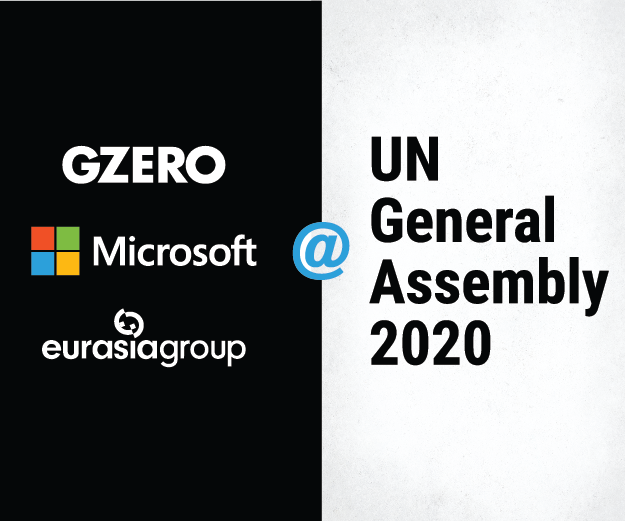The annual United Nations General Assembly (UNGA), the world's largest diplomatic event, normally entails leaders and representatives from the 193 UN member states descending upon New York for a full week of speeches, high-stakes meetings between governments, and street protests. UNGA has also had its share of surprising moments, like Soviet premier Nikita Kruschev (allegedly) banging his shoe on the desk, or Venezuela's Hugo Chávez suggesting that US President George W. Bush was the devil himself.
This year's UNGA will be very different because of COVID-19. Hotels in New York won't be full of diplomats, metal detectors, and secret service agents. The "contact sport" of diplomacy will go virtual, with great uncertainty over how improvisational breakthroughs often found on the sidelines of UNGA summits will translate to the digital world. And more individuals from around the world than ever before will be able to take part. In other words, UNGA will be very different, but hardly less important (or dramatic).
The COVID-19 pandemic makes this year's UNGA — the 75th — a once-in-a-generation opportunity for global leaders to unite around a single challenge, build the momentum necessary to tackle its effects head-on and chart a clear path forward for multilateralism... all while overcoming the obstacles of working virtually.
What will change? This year's UNGA will be mostly virtual, with world leaders delivering prerecorded statements and only one representative per UN member state attending in-person in the General Assembly Hall. All other events and meetings will take place online — requiring a 20th century institution, which still thinks in analog in many ways, to rapidly embrace 21st century technology. The pandemic will make proceedings more transparent for the general public, but the virtual setting may not be ideal for the most sensitive aspects of diplomacy that occur behind closed doors or the spontaneous meetings in the labyrinthine hallways of the UN. Many UN insiders worry that the virtual format may stand in the way of these unofficial meetings, which are often where the real diplomatic work gets done.
The overwhelming nature of the COVID-19 crisis may also divert attention from other top priorities such as biodiversity, and cash-strapped governments will be less likely to announce concrete financial commitments to meet the UN's Sustainable Development Goals (SDGs), the organization's roadmap for ending poverty and protecting the planet. Finally, there's a serious risk that the urgency of doing something quickly about the pandemic will make UN member states cut corners and compromise on sustainability, so in fact we'll end up "building back worse" than before.
What will stay the same? For the UN, 2020 was supposed to kick off its so-called "Decade of Action" to meet the 17 SDGs by 2030 — and it still is. Although that timeline has been complicated by the coronavirus, the UN has no immediate plans to push back the deadline, and now argues that the need to "build back better" after COVID-19 makes the objective of achieving all SDGs by the end of the decade even more urgent than it was at the beginning of the year.
This year was also expected to be all about the UN's own 75th birthday. A planned year-long celebration of the UN's accomplishments since its formation in 1945 has turned into an opportunity for the UN to draw lessons from its 75 years of experience dealing with global crises that can help the world recover from the pandemic. Finally, this year's high-level meetings will focus — as planned — on UN75, biodiversity, gender equality, and nuclear disarmament.
So, what's cooking for this year's UNGA, who are the key players, what's needed next, and how can you get involved?
What's the UN doing this year?
In 2020, UNGA will be anything but business-as-usual, starting with the schedule. The multiple high-level summits and events that are normally programmed for one week will take place throughout September and October to allow for most discussions and meetings to be virtual or in-person with social distancing. Here's the updated schedule of high-level meetings:
- 09/21 UN 75 anniversary commemoration. The UN will celebrate its 75th birthday under the theme The Future We Want, the UN We Need: Reaffirming our Collective Commitment to Multilateralism with a virtual address by Secretary-General António Guterres.
- 09/21-29 General Assembly debate. This is an opportunity for representatives from all UN member states to gather in the same room, and for each individual UN member state to raise any issue that's important to them. The process takes five days, and Brazil is the first to speak because it was the only country that volunteered to do so at the first debate in 1955. The US comes second, and representatives can talk about whatever they want... for a maximum of 15 minutes (the limit is rarely enforced).
- 09/30 Biodiversity Summit. As the degradation of biodiversity threatens global progress towards meeting the development goals, world leaders will adopt a framework to take urgent action on putting nature on a path to recovery by the end of the decade.
- 10/01 25th anniversary of the Fourth World Conference on Women. A quarter century since the adoption of the Beijing Declaration and Platform for Action at the Fourth World Conference on Women, UN member states will take stock of progress made and challenges ahead for gender equality and the empowerment of all women and girls, everywhere.
- 10/02 Commemoration of the International Day for the Total Elimination of Nuclear Weapons. This year's commemoration occurs in the shadow of a deterioration in arms control agreements between the US and Russia, the two states with the most nuclear weapons.
Who are the key players?
Governments are the most important players responding to global challenges, but they can't do so alone. Thus far, their response has also been insufficient, failing to rise to the level of international coordination seen in the wake of the Global Financial Crisis and other pivotal global crises. This presents an opportunity to rethink effective multilateralism for the next 75 years, and it's why this year's UNGA is also bringing together the private sector, NGOs and others interested in a better future for all to together figure out how to meet the 2030 deadline to achieve the development goals in the "new normal" the pandemic has created. Microsoft, for instance, has long committed to Agenda 2030 and this year opened a representation office in New York to advance its partnerships with the UN and its agencies.
What's needed next, and how can I get involved?
This year's UNGA will aim to forge a global compact to prepare for a post-pandemic world that first and foremost focuses on global health in a scenario where COVID-19 has wreaked havoc on global health systems worldwide. But that consensus will also have to address rising inequality as a direct result of the coronavirus, its devastating impact on labor markets, and the political divisions the pandemic has exacerbated. Only a multilateral approach can get governments, the private sector and all other players on the same page so the recovery leaves no one behind.
To mark its 75th anniversary, the UN has been running a global survey on the future of global cooperation: Will COVID-19 bring the world closer together, or rather lead to greater mistrust? Contribute your opinion on what the UN should prioritize in the coming years by taking part in the poll. The survey is open until the end of 2020, and preliminary results will be announced at the commemoration ceremony.
A sneak peek at the findings shows that over 90 percent of respondents believe that global cooperation is vital to respond to today's challenges, including COVID-19. Those surveyed have identified health, access to basic services, global solidarity and making economies inclusive as the most pressing short-term priorities, and addressing climate change, corruption, poverty and conflict/violence as the most vital long-term goals.
In the meantime, stay tuned for special coverage on four key themes — climate and sustainability, crisis response and recovery, digital inclusion, and digital peace — by GZERO Media in partnership with Microsoft and Eurasia Group.
Read more:














